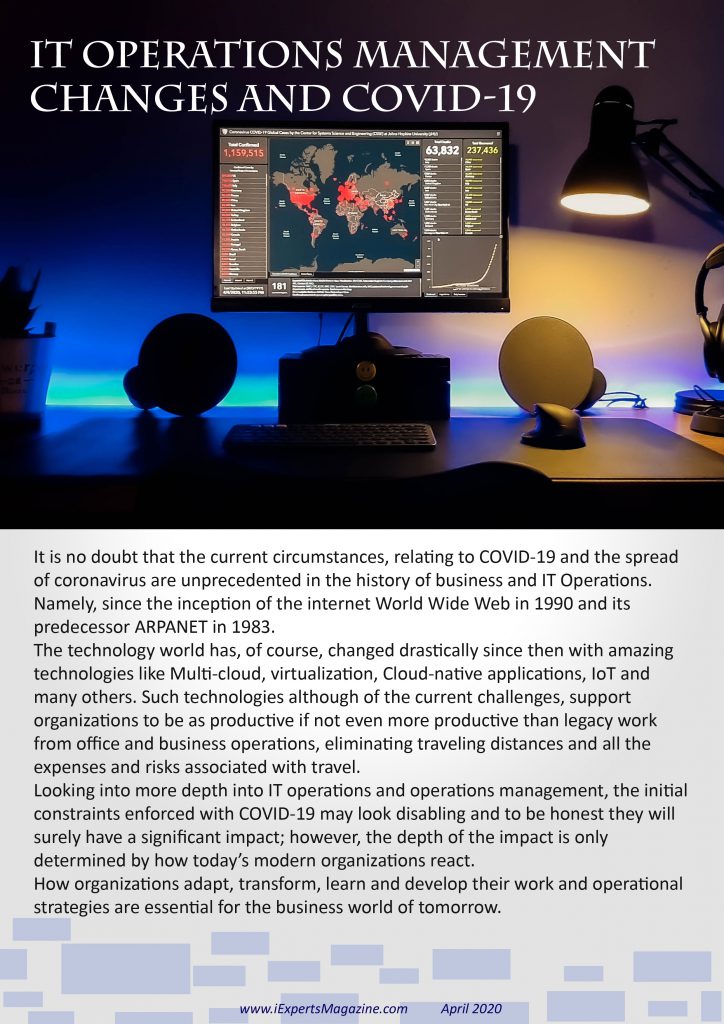
IT operations management changes and COVID-19

It is no doubt that the current circumstances, relating to COVID-19 and the spread of coronavirus are unprecedented in the history of business and IT Operations. Namely, since the inception of the internet World Wide Web in 1990 and its predecessor ARPANET in 1983.
The technology world has, of course, changed drastically since then with amazing technologies like Multi-cloud, virtualization, Cloud-native applications, IoT and many others. Such technologies although of the current challenges, support organizations to be as productive if not even more productive than legacy work from office and business operations, eliminating traveling distances and all the expenses and risks associated with travel.
Looking into more depth into IT operations and operations management, the initial constraints enforced with COVID-19 may look disabling and to be honest they will surely have a significant impact; however, the depth of the impact is only determined by how today’s modern organizations react. How organizations adapt, transform, learn and develop their work and operational strategies are essential for the business world of tomorrow.
It is with every change that there is an opportunity, such opportunities don’t come frequently, how organizations today perceive, recognize that this is an opportunity and indeed harness the knowledge, would make all the difference as to how we view and review the operational management concepts going forward.
In the next few lines, let us explore a few different aspects of IT operations management and how they are affected by COVID-19.
1- Corporate Culture & Citizenship behavior
Perhaps all great organizations have been built on great corporate culture, at least the ones that endure, corporate culture in a sense is a slow-moving beast – it is not built over weeks, it is only built with persistence, transparency, collaboration, vision and strong leadership that has to persist over months, years and sometimes tens of years.
It is needless to say that organizations who have built such a culture over years would be far less troubled with events like the COVID-19 outbreak, team members in such organizations naturally exhibit OCB (Organizational Citizenship Behavior), this becomes second nature to them, being asked to work from home or remotely doesn’t easily take that away – but rather enforces their sense of responsibility to the organization and its success which is consequently their own success.
It doesn’t take much thought to figure out that those organizations that haven’t invested in building a strong culture will surely suffer and will live the consequences of poor corporate culture and the clear disengagement of its team members.
2- IT enablement
It is often said that in today’s world, technology is no longer a nice to have, today’s modern IT vendor organizations disturb the market and industry embracing concepts like IT Transformation, Security transformation, Workforce transformation, and Digital transformation.
As important as selling, enabling and empowering their own customers to such transformations, IT organizations must undergo such transformation themselves first.
The limit to which any organization has embraced such concepts will determine how well they do in such crisis, the more such concepts have been explored, designed, implemented and embraced in everyday work activity, will not only decide how resilient such on the organization is but will also determine how much they can learn with such events like the COVID-19 pandemic.
3- Cross-Culture Management & Operations
In today’s world, the whole business world has turned into a small village with different IT technology and tools, ranging from Audio/Video, VOIP, Collaboration tools, etc. That not only helps collaboration across cultural and geographical boundaries but also challenges organizations to boost up their productivity, quality and delivery, using a diverse workforce.
The more the organizations have embraced such principles, namely thinking globally and acting locally, the more they will be resilient, agile and productive under such circumstances. Today we can only look at business and economy globally, with market forces that have a global effect on the whole world.
4- IT & Ethics
Last but not least are ethical considerations, that organizations need to adhere to, in the recent years the focus has been on data privacy and data protection as well as other important trends like ethics relating to ML (Machine Learning) and AI (Artificial intelligence) – how do we agree that a machine-made decision is either ethical or unethical.
Today we are faced with a more critical, life-threatening question because such ethical considerations today affect both the organization, the community around it and also the global markets – CSR (Corporate Social Responsibility) today plays a very important role in protecting both corporate employees, employee families and also the community around them that might be infected or simply support spreading such an epidemic.
In short, Organizations need to recognize that this is an opportunity to learn, develop and transform to the next chapter of IT operations, taking into consideration that the better the corporate culture is built, the better consideration of ethical matters, the better utilization of modern IT technologies and embracing cross-culture collaboration; the better that they can perform facing such a world spread epidemic like COVID-19.
By Philip Guindi
Director, VMware Global Support Services

